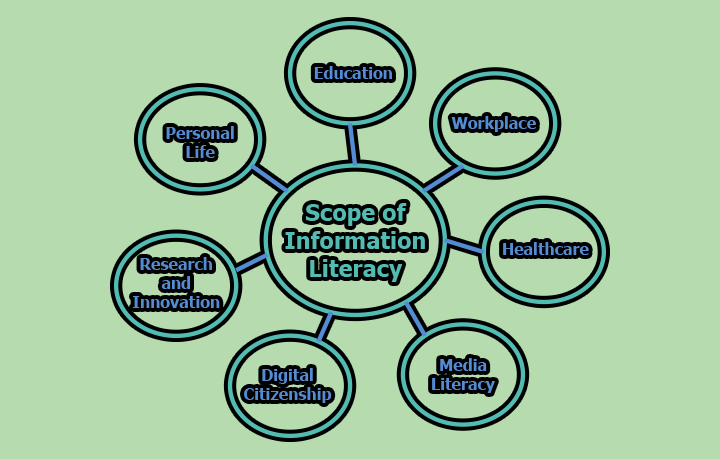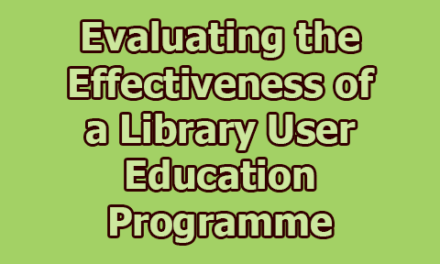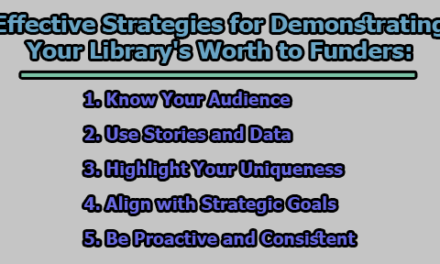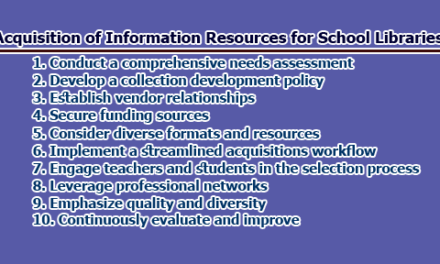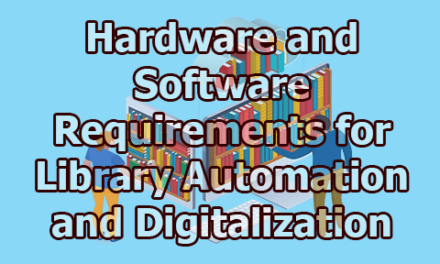Information literacy is a critical skill in the modern world that involves the ability to find, evaluate, and use information effectively and ethically. It encompasses a set of skills, attitudes, and knowledge that enables individuals to navigate the vast and complex information landscape in various contexts. Here, we are going to know about definitions, objectives, functions, and the scope of information literacy.
Definition of Information Literacy:
Information literacy can be defined as the ability to recognize when information is needed, locate and access relevant information efficiently, evaluate the credibility and quality of information sources, use information ethically, and apply the acquired information effectively to solve problems or make informed decisions.
Objectives of Information Literacy:
Some of the necessary objectives of information literacy are briefly given below:
1. Access: Information literacy aims to equip individuals with the ability to access information from various sources, both traditional and digital. This includes understanding how to use libraries, online databases, search engines, and other resources effectively. The objective is to ensure that individuals can navigate the information landscape confidently and retrieve the information they need in a timely manner.
2. Evaluate: Critical evaluation is a crucial aspect of information literacy. This objective involves teaching individuals how to critically assess the information they encounter. They learn to discern the credibility, reliability, and relevance of information sources. This skill helps individuals make informed decisions by avoiding unreliable or biased information.
3. Use: Information literacy emphasizes the effective use of information. This objective focuses on teaching individuals how to organize, synthesize, and apply the information they gather to solve problems or make decisions. It involves skills like data analysis, synthesis, and information integration, which are valuable in academic, professional, and personal contexts.
4. Ethical Use: Ethical considerations are integrated into information literacy objectives. Individuals are encouraged to use information ethically by respecting copyright and intellectual property rights, giving proper credit through citations, and responsibly sharing information. This objective promotes ethical behavior in the information ecosystem.
5. Lifelong Learning: Information literacy is not a finite skill but a lifelong pursuit. The objective is to instill a mindset of continuous learning. Individuals are encouraged to adapt to evolving information technologies and sources, keeping their knowledge up-to-date and relevant throughout their lives.
6. Critical Thinking: Critical thinking is a fundamental goal of information literacy. This objective involves teaching individuals to think critically about the information they encounter. They learn to question assumptions, identify biases, distinguish between fact and opinion, and apply logical reasoning. Critical thinking skills enable individuals to make well-informed judgments and decisions.
7. Communication: Effective communication is essential in conveying information to others. Information literacy aims to improve individuals’ ability to communicate their ideas and findings clearly and ethically. Whether through writing, speaking, or other forms of expression, this objective ensures that individuals can share their knowledge effectively with others.
Functions of Information Literacy:
Here, we are going to provide some of the crucial functions of information literacy:
1. Information Retrieval: The primary function of information literacy is to enable individuals to efficiently locate and access information from a wide range of sources. This includes using search engines, libraries, online databases, and other means to retrieve information that is relevant to their needs. The goal is to ensure that individuals can navigate the vast amount of available information and find what they are looking for effectively.
2. Information Evaluation: Information literacy involves the critical evaluation of information sources. Individuals learn how to assess the quality, credibility, and relevance of the information they encounter. This function helps individuals determine whether a particular source is trustworthy and suitable for their specific purpose. By evaluating information critically, individuals can make informed decisions and avoid relying on unreliable or biased sources.
3. Information Use: Another essential function is the effective use of information. Information literacy equips individuals with the skills to organize, synthesize, and apply the information they gather. Whether it’s for academic research, professional tasks, or personal projects, this function ensures that individuals can use information to complete tasks, make decisions, and solve problems efficiently.
4. Ethical Information Use: Information literacy includes a strong emphasis on ethical behavior in using information. This function encourages responsible and ethical practices, such as proper citation, avoiding plagiarism, and respecting intellectual property rights. By adhering to ethical standards, individuals contribute to the integrity of the information ecosystem and show respect for the work of others.
5. Continuous Learning: Information literacy promotes a commitment to lifelong learning and skill development. In a rapidly changing information landscape, this function encourages individuals to adapt and stay current with new technologies and sources of information. It emphasizes the importance of continuous learning to remain informed and capable in an evolving world.
Scope of Information Literacy:
The scope of information literacy is broad and applicable in various domains, including:
1. Education: Information literacy is fundamental for students and educators alike. Students need these skills to conduct research effectively, complete assignments, and develop critical thinking abilities. Educators employ information literacy to guide students in acquiring and evaluating information for academic purposes.
2. Workplace: In the professional world, information literacy is indispensable. Employees need these skills to gather data, analyze market trends, make informed decisions, and stay updated in their respective fields. Information literacy contributes to improved problem-solving and decision-making in the workplace.
3. Healthcare: Healthcare professionals, including doctors, nurses, and researchers, rely heavily on information literacy. They must access and interpret medical information accurately to provide quality care to patients, stay current with medical advancements, and contribute to medical research.
4. Media Literacy: In the era of abundant information and disinformation, media literacy is closely tied to information literacy. Being able to assess the credibility and potential biases of information sources is vital for making informed judgments about news, articles, and other media content.
5. Digital Citizenship: Information literacy plays a fundamental role in promoting responsible online behavior. This includes safeguarding personal information, recognizing online threats, evaluating the trustworthiness of websites, and engaging in respectful online discourse. It empowers individuals to be responsible digital citizens.
6. Research and Innovation: Researchers and innovators across various fields depend on information literacy to advance knowledge and develop new ideas. This includes conducting literature reviews, critically evaluating existing research, and effectively communicating their findings.
7. Personal Life: Information literacy is not confined to professional or academic settings; it’s also relevant in everyday life. Individuals need these skills to make informed decisions about managing finances, making purchases, staying updated on current events, and accessing resources for personal development and hobbies.
In conclusion, information literacy is a multifaceted skill set that equips individuals to navigate the information-rich world effectively, make informed decisions, and contribute meaningfully to their personal, academic, and professional lives.
References:
- American Library Association. (2000). Information literacy competency standards for higher education. https://www.ala.org/acrl/standards/informationliteracycompetency
- American Library Association. (2017). Framework for Information Literacy for Higher Education. http://www.ala.org/acrl/standards/ilframework

Library Lecturer at Nurul Amin Degree College

